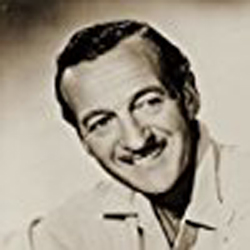
David Niven
David Niven, the British actor who made his name in Hollywood from the 1930’s and was a popular actor through the next several decades. His humour shone through and his self-deprecating manner endeared him to everyone who met him or watched him on screen.
Although his urbanity and charm belied his background, his wasn’t an easy life, he had great woes and great happiness. He wrote his autobiography (one of two) in 1971, called “The Moon’s a Balloon” and it immediately became a best-seller.
He wrote in the introduction to this book: “Evelyn Waugh penned these words: ‘Only when one has lost all curiosity about the future has one reached the age to write an autobiography.’ It is daunting to consider the sudden wave of disillusionment that must have swept over such a brilliant man and caused him to write such balls.”
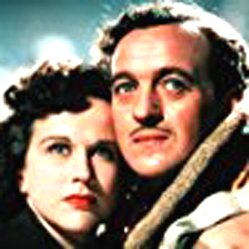
A Matter of Life and Death (1946)
His second book was named “Bring on the Empty Horses” alluding to the director Michael Curtiz, who was directing Niven on the film “The Charge of the Light Brigade”. Niven refers to him as “the man whose Hungarian-orientated English was a joy to us all”. High on the rostrum during filming, Curtiz had decided the moment had come to order the arrival on the scene of a hundred rider-less chargers. “Okay”, he yelled into a megaphone, “Bring on the empty horses!”
David Niven didn’t start out as an actor, he almost got into acting by mistake. Fortunately for us, his legacy shows that his long career would give us so many great performances as an actor, excellent in both comic and dramatic roles. The younger generation don’t have the joy of seeing most of his movies, but may remember him from spoofs “Pink Panther” or “Casino Royale” or even “Around the World in Eighty Days”. But there was much more to him than that.
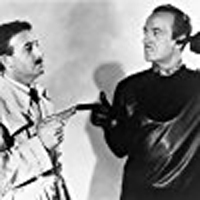
With Peter Sellars in The Pink Panther
One of my favourite David Niven films was his performance as Major Angus Pollock in Terence Rattigan’s “Separate Tables” (from his play) with Deborah Kerr, Rita Hayworth, Wendy Hiller and Burt Lancaster. The Oscar winning director was American Delbert Mann,(Marty, That Touch of Mink) who we don’t hear enough about any more. David Niven won a deserved Oscar for best actor in this movie. Niven’s sensitive performance will remain within my memories, as will Deborah Kerr in her role as a downtrodden spinster opposite him. The story probably wouldn’t resonate any more as shame seems to have left our vocabulary.
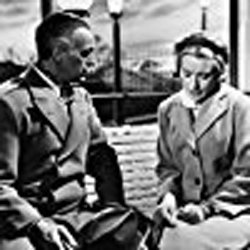
Separate Tables with Deborah Kerr
Niven served with the British commandos in World War II, leaving at war’s end with the rank of colonel. His father went off to Gallipoli in 1915 during WW1, and was among the unfortunates not to return. Niven explained that “I’m afraid my father’s death meant little or nothing to me at the time; later it meant a great deal” Niven was 5 years old when he lost his father. He heard the news in a “rather incoherent interview” with his mother, who was French, and who had “trouble explaining what ‘missing’ meant”.
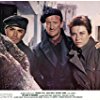
The Guns of Navarone
Niven’s father, although very much the country gentleman, he apparently cheerfully went off to war, taking with him as troopers; his valet, his under gardener and two grooms, and he was hugely in debt at the time of his death. The house in Gloucestshire, still today a very beautiful part of the UK countryside, was sold, and they moved to a ‘large damp house in Cadogan Place’ near Sloane Square.
Niven had two sisters, Grizel and Joyce and an elder brother Henri, who was a navel cadet at Dartmouth. His mother had become remarried to a man who had come to be known as “Uncle Tommy” and was part of his mother’s circle in London. Niven was sent to a boarding school near Worthing. He hated it and after two years was sent to Heatherdown at Ascot, a ‘posh’ school where most pupils went on to Eton.
He was expelled from there at age 10 and literally packed off to a school “for difficult boys” run by a Commander Bollard. His exploits there, are described with Niven’s humorous panache, despite describing himself as a ‘thoroughly poisonous little boy”. One of the things he learnt there was the Morse code that would incidentally, come in useful in his later career.
He attended Sandhurst Military academy, still one of the most world-renowned military academies, and on completing his final terms, had been promoted to Under-Officer. In the interim he had managed to run a rugger blue and had produced and acted in some concerts. He was also popular with the girls.
He sat for his final exams, which he “discovered with surprise that they came quite easily to me.” He applied for regiments and was, after some clever subterfuge, accepted into the Argyll and Southern Highlanders. The only one of the six Highland Regiments that wore trews (trousers) instead of kilts, hence he considered it to be one of the only Highland regiments he would consider.
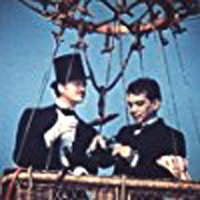
In Round the World in 80 days
David Niven wasn’t your average Hollywood actor. He had moved to the USA in the 1930’s and found himself an actor almost by chance, he started out as an extra and got noticed. Before he did so, he had been helping out on fishing boats, rather fishing yachts with stars and directors, whereby he, as deckhand, would grapple with helping haul into the boat the Marlin or other large fish that a star or director had landed.
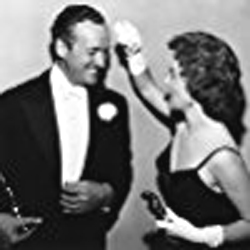
At the Oscars with Susan hayward
As a deckhand on one of these trips, he had helped Clark Cable among others, and was immediately star struck. He described Gable as a very good kind of man and through his interest in fishing, when Niven in 1935 landed his first big role, he met Gable again at that year’s Hollywood Oscar after-. Gable recognised him and invited him fishing. They became friends.
But Niven was friends with many people from Hollywood and beyond. In particular the actor Errol Flynn, with whom he shared a house, later described by Cary Grant as “Cirrhosis by the Sea” due to the heavy drinking that went on there. Niven knew and was befriended by all the “named” actors and actresses of the day, Humphrey Bogart and in particular Bogart’s wife, Lauren Bacall, and countless others.
to be continued...
We seem to share a lot of the same interests. I was drawn by the subject matter, then realised it was by you :) I have read both of David Niven's autobiographies, and thoroughly enjoyed them. I read them as much because of the characters he described as his nonchalant, self-deprecating writing style. I could tell he was madly in love with Merle Oberon. I read these books a very long time ago, while still a teenager. You have stirred my memories of time and place. Thank you for sharing.
Downvoting a post can decrease pending rewards and make it less visible. Common reasons:
Submit
I intend to do more like this as I love the movies and theatre. Glad we share an interest!
Downvoting a post can decrease pending rewards and make it less visible. Common reasons:
Submit
Great and good are seldom the same man.
- Winston Churchill
Downvoting a post can decrease pending rewards and make it less visible. Common reasons:
Submit
Thank you for your comment. I am assuming that you are a wise old man, now that I've read your comment!
Downvoting a post can decrease pending rewards and make it less visible. Common reasons:
Submit